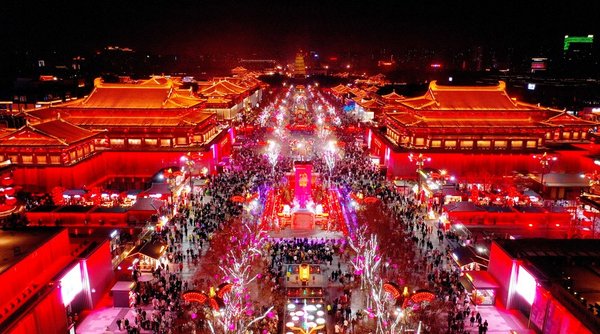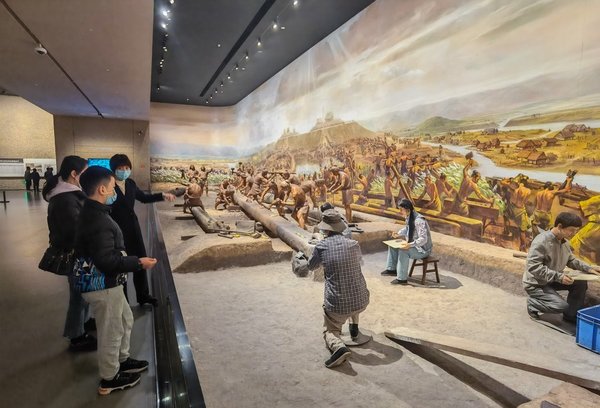Xinhua Headlines: Report on CPC's 'Second Integration' Theory Unlocks Understanding of China
 |
| This aerial photo taken on Jan. 28, 2023 shows a night view of the Datang Everbright City scenic area in Xi'an, northwest China's Shaanxi Province. [Xinhua/Liu Xiao] |
* Understanding China requires grasping the "cultural and civilizational soil" in which the CPC is firmly rooted.
* The "Second Integration" provides insight into Chinese modernization and a new model for human advancement.
* The integration serves as China's new statecraft in the new era, answering "Why China is China" based on its history and culture.
BEIJING, July 2 (Xinhua) — A new research report from Xinhua News Agency's think tank delves into the Communist Party of China (CPC) concept of integrating the basic tenets of Marxism with fine traditional Chinese culture, known as the "Second Integration."
The report by the New China Research analyzes the connotation and global significance of the "Second Integration," saying the integration opens a new frontier in adapting Marxism to the Chinese context and the needs of the times.
The "Second Integration" serves as a key to unlocking the understanding of China in the new era, providing insight into Chinese modernization and a new model for human advancement, according to the report. It also offers a valuable perspective for observing the relationship between China and the world.
The concept was introduced by President Xi Jinping, also general secretary of the CPC Central Committee and chairman of the Central Military Commission, in his speech commemorating the CPC's 100th anniversary on July 1, 2021.
It builds on the CPC's "First Integration" theoretical synthesis — integrating the basic tenets of Marxism with China's specific realities — which was summarized in the 1940s and has successfully guided China.
Experts in CPC history and traditional Chinese culture have acclaimed the release of the report titled "The 'Second Integration' that Transforms China — Theoretical Innovation and Practice in Building the Modern Civilization of the Chinese Nation."
The report helps explain to the world why China possesses such strong governance and vitality, and why it is a crucial force in maintaining world peace and development, says Zang Fengyu, dean of School of Philosophy, Renmin University of China.
Two Miracles
Under the CPC's leadership, China has achieved rapid growth and stability for over seven decades — feats widely referred to as "two miracles." The report says understanding China requires grasping the "cultural and civilizational soil" in which the CPC is firmly rooted.
The report describes China's "two miracles" as truly remarkable, featuring "security, stability, development, and advancement" alongside 10,000 years of culture and more than 5,000 years of civilization that continues to thrive today.
"Without China's 5,000-year-old civilization, where would the unique characteristics of China come from? And without the unique characteristics of China, where would our successful socialist path with Chinese characteristics be today?" said Xi during a March 2021 visit to a memorial hall dedicated to Zhu Xi, a Chinese philosopher of the 12th century.
The report says understanding China today hinges on understanding the CPC, which in turn requires understanding the "cultural and civilizational soil" in which the Party grew.
The report describes the "Second Integration" synthesis as a significant advance in the CPC's theory.
It says the synthesis fully captures the current landscape, aligns with the Chinese national rejuvenation goals, and symbolizes Chinese leaders guiding people to reconstruct historical perspectives, reinterpret their civilization, and elucidate China's governance.
 |
| People visit the Liangzhu Museum in Yuhang District of Hangzhou, capital of east China's Zhejiang Province, March 4, 2023. [Xinhua/Xu Yu] |
Connotation
The report says integrating the basic tenets of Marxism with fine traditional Chinese culture enriches China's socialist path with the "bloodline and civilization" of the Chinese nation.
It says this integration combines communist and socialist beliefs with the millennia-old ideals of the Chinese people — Xiaokang (a well-off society), common prosperity, and world harmony.
While adhering to historical materialism, the report says, the CPC creatively borrows the "reasonable kernel" of China's people-oriented ideology spanning 5,000 years of history.
The result has been a people-centered development philosophy that elevates ancient Chinese people-oriented thinking to a new level, the report adds.
The integration also features combining core socialist values with the traditional values of the Chinese nation, creating a source of spiritual values for the nation, the report says.
China's fine traditional culture has always embodied the spirit of pursuing the right path with righteousness, it notes.
The report says that the integration also combines the vision of a community with a shared future for humanity proposed by Xi with a traditional Chinese diplomatic approach centered on harmony among nations.
Global Inspirations
The report says the "Second Integration" serves as China's new statecraft in the new era, answering "Why China is China" based on its history and culture.
A nation's culture defines its soul, and China's confidence lies in its over 5,000 years of heritage, the report says. It stresses accurately positioning China's fine traditional culture, which nurtured core socialist values and withstands global cultural influences.
The report points out that the new theory "goes beyond Western centrism and China's outdated notions since modern times, reconstructing Chinese people's historical awareness of their own country."
The "Second Integration" can effectively explain today's reality of China's success, further enabling the Chinese people to grasp the historical initiative and spiritual initiative, it says.
"Through the theory, Chinese leaders have reshaped the country's cultural identity and public consensus, thereby strengthening national identity and political identity," reads the report.
The report says the integration helps China reinterpret its civilization and promote civilizational exchanges.
China emphasizes allowing cultural exchanges to transcend estrangement, mutual learning to transcend clashes, and coexistence to transcend feelings of superiority, the report adds.
Additionally, the report notes that China's tradition of pursuing harmony with the world and the CPC's global vision differs from the Western worldview that treats the world as an object to conquer.
"China in the new era approaches the world with an attitude of interconnection, interdependence, win-win cooperation, and harmonious coexistence," it says.
(Source: Xinhua)
Please understand that womenofchina.cn,a non-profit, information-communication website, cannot reach every writer before using articles and images. For copyright issues, please contact us by emailing: website@womenofchina.cn. The articles published and opinions expressed on this website represent the opinions of writers and are not necessarily shared by womenofchina.cn.








.jpg)

 WeChat
WeChat Weibo
Weibo 京公网安备 11010102004314号
京公网安备 11010102004314号